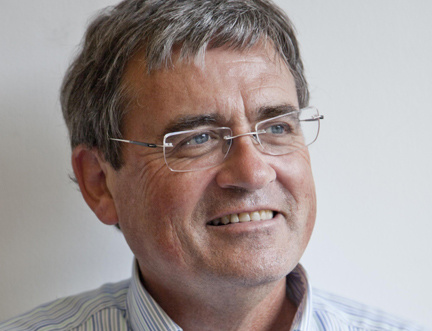More articles Tuesday 18 August 2015 7:20pm
Professor Condemns Public Stigma over Mental Health today at Book Festival

Governments and the public have been complicit in marginalising the mentally ill allowing treatment services to be cut, a leading expert on the sociology of madness said at the Book Festival today. Professor Andrew Scull, author of Madness of Civilisation which traces the history of madness over millennia, said that the public stigma and discomfort that still exists over the mentally ill has made it easier for governments to reduce budgets for mental health services.
Speaking earlier today in a sold out event, Scull, Professor of Sociology at University of San Diego, said there was a "sense of complicitness" between the two bodies. "There's the saying 'out of sight and out of mind', and that's where we want people like this. We don't want our attention to drawn to them,” he said. "It's very hard to generate sympathy. More often they are the object of fear, exaggerated fear, and the less we know of them, the easier it is to indulge in the dark, gothic imaginations that we have about them. We turn away because it's very difficult subject."
Scull was also highly critical of the dominance of psychiatric treatment by pharmaceutical companies. He said: "We are all taught that you're depressed because the chemical soup in your brain is somehow out of whack. You need more serotonin, then you won't be so depressed any more. That is scientific nonsense but it is scientific nonsense that the drug companies have peddled very successfully. Do these drugs work? For some people they are life-saving. For other people the balance between the side-effects and helpful are very narrowly poised. For another group of patients for they just don't work and the negative side-effects are all they get. So it's a very complicated story."
The situation was complicated further, Scull explained, by a "shotgun approach" that psychiatrists take to treatment, prescribing lots of drugs to try and find a combination that works. "Very often people end up with polypharmy, [numerous drugs], increasing the risk of getting side-effects, and then they get drugs for those side-effects which in turn have their own side-effects. And we're not talking about trivial things here," he said. "The second generation of antipsychotics that drug firms sold, because they could make massive new profits patenting them, produced massive weight gain in patients, I'm talking two, three, four, five, six stone of additional weight, which brings additional heart problems, diabetes and shortened life-span,"
He also said that pharmaceutical companies had attempted to keep this complexity suppressed, using lawsuits to stop the information coming out, and where they have lost them, have had to pay out billions in damages.
Even within treatment of conditions, Scull explained that there was a two-tier approach with resources being targeted at people with milder conditions which are “more susceptible” to drug treatments which left “the more severely disturbed to suffer even more neglect.”
He also said that because most patients with some form of mental condition usually go and see a GP rather than a specialist, pressures of time meant that generally a drug treatment will be prescribed. But he added that he was pessimistic about the prospect of society moving away from the drug-led treatment, as the concept of 'care in the community' as a form 'de-institutionalisation' of mentally-ill people had failed. "Part of the way the community care proceeded was by demonising the old asylums," he explained. "The reality that there was very little community and even less care tended to be elided.”
Professor Scull’s event was part of our Staying Well strand of events, which includes June Andrews, Director of the Iris Murdoch Centre for Dementia in Stirling, who talks about her one stop guide to dementia on Monday 24 August, and also participates in a discussion later the same day about our aging population with Susana Moreira Marques, whose book Now and at the Hour of Our Death captures a remarkable project in palliative care in Portugal. Also on Monday 24, Marion Coutts discusses The Iceberg, a loving memoir of the 18 intense months leading up to her partner Tom Lubbock’s death from a brain tumour, and she is joined by Erwin Mortier whose beautifully written Stammered Songbook is the story of his mother’s descent into dementia.
- 2026 Festival:
- 15-30 August
Latest News
 Major new partnership with Celtic Connections
Major new partnership with Celtic Connections



